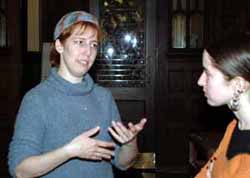TC Sponsors Historic Youth Activism Conference
Leanne Stahnke, a doctoral student in the department of Curriculum and Teaching, has been conducting a research project on youth engaged in antiracism work. As she interviewed youth activists, she began to think about the way youth are portrayed in research, and the lack of research on youth activism. Along with John Broughton, Associate Professor of Psychology and Education, she organized a conference on activist youth and education to combat the prevailing images of youth as at-risk.
The conference, held on April 11th and April 12th at Teachers College, brought together educators, youth activists and organizers who work with youth to learn about each other's work and some of the issues raised in youth activism. Nearly 150 people met in Milbank Chapel to hear from a wide variety of panelists including youth activists, adult organizers who work with youth, teachers, filmmakers, spoken word poets and musicians.
At the opening session, Stahnke welcomed the educators and researchers in the audience and explained the motivations behind the conference. The goals of the conference included speaking back to research that frames youth as incompetent, hormone-driven and at-risk; highlighting creative organizing by youth; exploring activism that seeks to create structural change; looking at the differences between adult and youth activism; and subverting the ways academics who research youth are framed as experts by acknowledging the youth themselves as experts on their own experience. Stahnke was joined by Slab Tzu, an organizer with the Student Liberation Action Movement (SLAM), who spoke about the efforts of student activists to stop tuition hikes at the City University of New York.
Panel discussions ranged from youth impact on public policy to youth-produced video and community organizing. Youth activists spoke about their experiences of feeling alienated and disenfranchised in their schools, and finding a more powerful education through their activist work with community organizations. Youth activists came from community organizations across the city including Make the Road by Walking, Youth Force, Central Brooklyn Partnership, FIERCE (Fabulous Independent Educated Radicals for Community Empowerment), Malcolm X Grassroots Movement, South Asian Youth Action, Uptown Youth for Peace and Justice, YouthBloc, and YaYa (Youth Activists-Youth Allies Network). Spoken word poets from Urban Word entertained the audience throughout the two days, and the conference ended with a performance of political hip-hop by G.A.M.E.
Several panels explored the use of media as an organizing tool. One panel entitled "Youth Representation and Webzines" featured several of the young editors of HarlemLive, an online youth-produced news magazine. The panelists spoke about their experience writing and editing stories and managing the Web site.
A common theme was the low expectations adults have of teenagers. Many adults who see the HarlemLive web site are amazed that it is entirely written and produced by teens. The panelists all saw HarlemLive as an example of what teens are capable of when they have a forum in which to express their opinions. Another panel featured clips of youth-produced video on such issues as environmental justice, police harassment of queer youth, and the detention of immigrants.
"The conference featured youth speaking about the ways in which they are working to change oppressive social structures. It was intended to speak back to the way teachers typically learn about youth cultures. Social science literature sometimes frames youth as dangerous or poor decision-makers. Furthermore, youth are never featured as experts on their own experiences. I hope that after hearing youth speak about their activism, the educators in attendance were moved to reconsider how they approach their work with youth," Stahnke said.
Published Thursday, May. 1, 2003
